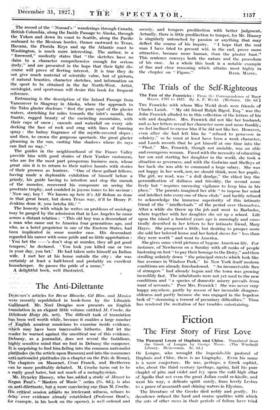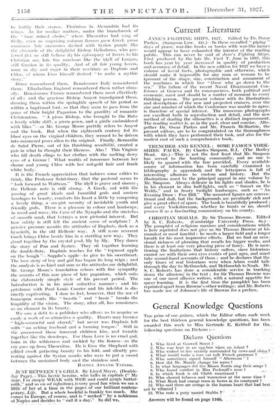Fiction
The First Story of First Love
OF Longus, who wrought the imperishable pastoral of Daphnis and Chloe, there is no biography. Even his name is a mere conjecture. He was, perhaps, a Greek sophist, who, about the third century (perhaps, again), laid his pure chaplet of pine and violet and ivy upon the cold high altar of Apollo that not even the great Julian could re-kindle, and went his way, a delicate spirit surely, from lovely Lesbos to a peace of amaranth and shining waters in Elysium. The literature of the Greeks died nobly and gently. Its decadence refused the hard and coarse qualities with which_ the arts of other races in their periods of failure have tried to fortify their stance. Plotinism in Alexandria had its wings. As for meeker matters, under the branchwork of the " bare ruined choirs," where Theocritus had sung of Sieily, even as surprising autumn flowers grew Greek prose romances—late anemones dashed with Syrian purple like
I e chronicle of the delightful Bishop Heliodorus, who pre- ferred (let us still believe it) his episcopacy of lovers to his Christian see, late fine narcissus like the idyll of Longus, still Grecian in its quality. And of all fair young lovers, none so shy and eager in their novitiate as Daphnis and Chloe, of whom Eros himself desired " to make a mythic story."
Rome remembered them. Renaissance Italy remembered them. Elizabethan England remembered them rather clum- sily. Renaissance France remembered them most effectively of all ; and the gracious Bishop Amyot transfigured them, drawing them within the springtide speech of his period as within a baptismal font, so that they seem to pass from the grace of their bright Paganism to the gracility of romantic Christendom. "A pious Bishop, who brought to the Babe a lovely white shift, a green gown, and a girdle embroidered with lilies "—so Mr. George Moore prettily refers to Amyot and the book. But when the eighteenth century fed its blasé eyes on the virginal children, they seemed to be driven into mannered poses alien to the original. Finally, Bernardin
be Saint Pierre, out of his throbbing seasibilite, created a pair in what he thought their likeness. Alas ! This Virginie who till death clings to her clothes with the melting dewy eyes of a Greuze ! What worlds of innocence between her shame and young Chloe with her red-gold hair and frank white body.
It is the French appreciation that induces some critics to think, like Professor Saintsbury, that the pastoral seems to "look forward to Watteau." The idyll is grave and sincere ; the Hellenic note is still strong. A Greek, sad with the passing of great ideals and beautiful gods and austere bondages to beauty, comforts his heart a little by composing a lovely thing, a sea-girt security of inviolable youth and friendly gods. There is a pleasure in colour and landscape, in wood and wave, the Cave of the Nymphs and the stretches of smooth sand, that betrays a new pictorial interest. But how subtly is still felt the ancient sense of sculpture ! A pensive pressure moulds the attitudes of Daphnis, dark as a hyacinth, in the old. Hellenic way. A, still more reverent Ouch brings Chloe beside him in a startling new way. They stand together by the crystal pool, lily by lily. They dance the story of Pan and Syrinx. They .sit together learning the double-flute. Daphnis reaches -for the "topmost apple on the bough "—Sappho's apple—to give to his sweetheart. The love story of boy and girl has begun its long reign ; and the analysis is as kind and sure as the attitudes are delightful. Mr. George Moores translation echoes with fine sympathy the accents of this rare piece of late paganism, which suits the elaborately simple style of his 'present' period. The Introduction is in his most seductive manner ; and his petulance with Paul Louis Courier and his ink-blot is dis- tinctly captivating. I dare to feel, however, that the use of homespun words like " beastie " and " lassie " breaks the limpidity of the vision. The story, after all, has remoteness
as an clement in its beauty. -
We owe a debt to a publisher who allows us to acquire so easily a work of so attractive a quality. Hearts may become " high-sorrowful and cloyed," but never was Daphnis left with "an aching forehead and a burning tongue." Still in the greenwood those innocent children kiss, and tremble together like the dewdrops. For them Love is no cruel god, bOin in the wilderness and suckled by the lioness—as the cry goes up from Theocritus. He is Eros the Shepherd with girded crook gathering beauty to his fold, and silently pro- teating against the Syrian monks who were to put a sword between the unstained body and the stainless soul.
RACHEL ANNAND TAywit•



























 Previous page
Previous page